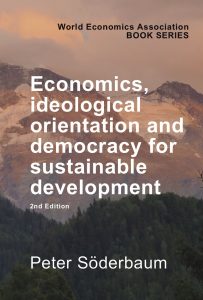Economics, ideological orientation and democracy for sustainable development
(2nd edition)
Peter Söderbaum
Where to buy this book
About the book
Sustainable development is a challenge for individuals in different roles, for organizations, for communities at local, national and global levels. How can we deal with climate change, biological diversity loss or pollution of land and water? How can social inequality be reduced and democracy strengthened?
Can mainstream neoclassical economics be further developed to deal with these issues? While not excluding positive contribution from mainstream economics as part of a pluralist perspective, the main strategy in the book is based on a judgment that new conceptual frameworks and a new economics language is needed. It is even argued that the close to monopoly position of neoclassical theory at university departments of economics globally may be part of the sustainability problems faced.
When compared with neoclassical theory ‘economics’ and ‘the economy’ are understood in alternative ways. A ‘political economic person’ replaces ‘Economic Man’ assumptions. Similarly, the neoclassical profit-maximizing firm is replaced by a ‘political economic organization’ guided by its ‘mission’. Decision-making is seen as a “matching” process where optimization becomes a special case. Positional analysis (PA) is proposed as a more open alternative to cost-benefit analysis (CBA).
Democracy is looked upon as an essential part of economics. Value-neutrality is not possible. Instead ideological orientations have to be articulated and discussed openly. A specific interpretation of ‘sustainable development’ exemplifies an ideological orientation to be compared with ‘market and economic growth’ ideology for example. To get closer to sustainable development, institutional changes of a more or less radical kind have to be considered.
In this – the 2nd Edition of the book – Chapters 6, 7 and 8 are new. In Chapter 6 the actor-network perspective is further elaborated as is the potential role of economics students. Chapter 7 focuses on “ideology” and “ideological orientation” as essential concepts in economic analysis. Sustainable development, for instance, can be understood as an ideological orientation that differs from neoliberalism the latter with its emphasis on GDP-growth and monetary profits in business. In Chapter 8 expectations on various actor categories in relation to sustainable development are discussed. In an Appendix (previous Chapter 6 in the earlier version) some experiences of the author as actor are indicated. Professors of economics are not neutral actors.
About the author
Peter Söderbaum is professor emeritus in ecological economics at Mälardalen University, Västerås, Sweden and is the author of books such as Ecological Economics (Earthscan, 2000) and Understanding Sustainability Economics(Earthscan, 2008). He is member of the editorial advisory board of Ecological Economics and International Journal of Pluralism and Economics Education.
Contents
- The illusion of a value-free economics
- Redefining economics in relation to multidimensional thinking and democracy
- From Economic Man to Political Economic Person
- Ecological economics – a political perspective
- Politics for sustainable development
- How students and other actors can contribute to sustainability economics and politics
- Ideology matters within and outside science and universities
- Conclusions on sustainability analysis and policy
Appendix. A journey as an institutional ecological economist
You will have the option to download this book as a PDF.
Endorsements
Peter Söderbaum provides an inspiring, democratically-oriented alternative to current economic thinking. Through his proposals for positional analysis and conceptualisation of social actors as political economic people, he highlights the interdependence of technical, normative and political issues. Moreover, he does so in a clear and highly readable way. He also issues a very welcome challenge to traditional accounting systems, which are currently closely connected with neoclassical economics. I strongly recommend this book to all those who are searching for economic theory and practice that can address plurality, uncertainly and the value-laden nature of sustainability appraisals.
Judy Brown, Professor of Accounting, Victoria University of Wellington, New Zealand
| ISBN (eBook): | 978-1-911156-21-5 |
| ISBN (print): | 978-1911156383 |
